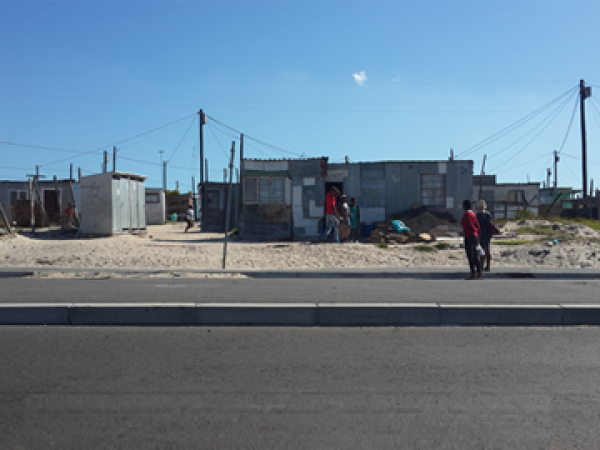

The realities of living in Khayelitsha have featured throughout the Commission. Photo by Adam Armstrong.
16 May 2014
“We don’t need to focus on fighting crime … we need to heal our communities,” testified Professor Pumla Gobodo-Madikizela at the Khayelitsha Inquiry into policing this morning. Her testimony described the social and psychological trauma of the Khayelitsha community, and how that results in vigilante killings.
Gobodo-Madikizela was asked by the Commission to explain why vigilante killings are so common and so violent in Khayelitsha. She responded that the residents of Khayelitsha, and many other parts of South Africa, endure trauma and humiliation. The outcome of this combination can be intense violence.
Gobodo-Madikizela sat on the Truth and Reconciliation Commission. She is now based at the University of the Free State.
She conducted interviews with residents of Khayelitsha about their experiences of vigilante killings and violence in the township. During the three days she did this, there were four vigilante killings in the township. She read aloud, from her research, the testimony of one woman she interviewed who described a vigilante killing:
We heard a woman screaming “I-bag yam! I-bag yam! Nal’isela! (“My bag! My bag! Here is a thief!”) In no time, I mean, in no time, everybody was coming out, slamming doors behind them. I mean, it was like a split second – and they were all dressed in their clothes, not pyjamas. It was as if they were waiting, ready all night for exactly this kind of thing to happen. Then they descended upon this man – they came with all sorts of weapons to assault him. Rocks on the street were thrown at him. In no time, the man was gone – in no time – they had finished him. Think about it, in a matter of a few minutes, perhaps seconds, a man is dead, killed by a group of people in my community for snatching a woman’s handbag on her way to work. Glancing at his body lying on the side of the street as I went to work, I saw that a large concrete slab – you know those slabs used to divide freeway roads. A concrete slab had been thrown on the back of his head to finish him off.
Gobodo-Madikizela also described what she meant by the shared humiliation of residents of Khayelitsha. “When we are raped, it is extremely humiliating … When our loved ones are raped or our loved ones are traumatised and violated in any way, it is a humiliating experience.”
She testified that it is difficult for the residents of informal townships when they go into the city centre and see the differences between the way the rich and poor live. They experience safety in the city, and then return to the townships where they experience deep unsafety and vulnerability to violence. They undergo “profound abuse and trauma.” They live constantly “at threat not only of your bag being stolen, but of your body being stolen – through being raped or being stabbed.”
She also described the sense of hopelessness that many living in poverty experience, “Think for example about the young men who go for initiation. They come back. They feel that they are now men. They call themselves men … What does manhood mean? Manhood means you take responsibility. You have a job. You have settled pride around yourself, but they come back. They are nothing. They wake up every morning, after having been called men, facing this yawning void of emptiness. There is nothing in their lives. That is humiliating.”
She continued, “These experiences [of trauma and humiliation], are shared as a group, by a group, by a community. The identity of the group is defined by this traumatic event.” She explained that the group or community may act out and express this trauma collectively, through intense group violence, as seen in the vigilante murders.
She further explained that with such high levels of violence comes a sense that violence is normal, an accepted part of the environment.
Gobodo-Madikizela argues in her report that the problems of policing cannot fully account for the development of a culture of vigilantism in Khayelitsha. These social issues are bigger than the police, she testified. She said that the trauma and humiliation that lead to vigilante killings cannot be solved through policing and that there is a need for healing within the communities, a rebuilding of trust, respect and shared social values.
Advocate Norman Arendse, representing SAPS, pointed out that the trauma the police experience was overlooked in her report and her testimony. The police experience and witness high levels of violence and trauma on a regular basis. Gobodo-Madikizela acknowledged that the police do experience high levels of trauma and their experiences should not be overlooked, though this was not the focus of her report.